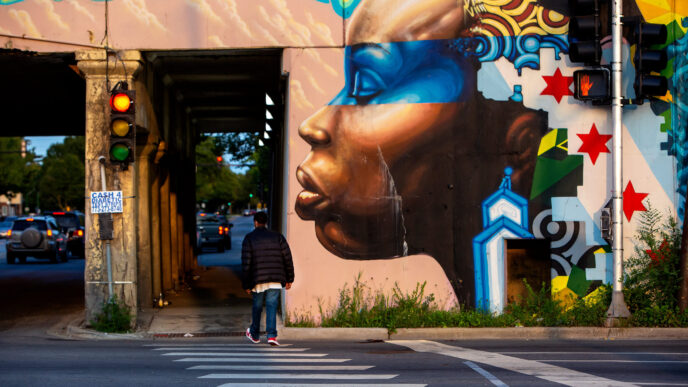Increasing Wealth in the Chicago Region’s Underinvested Communities
We are working toward a day when everyone in the Chicago region* has enough wealth to care for their family and invest in the future. Today, far too many do not, contributing to issues such as housing insecurity, unacceptable health disparities, gun violence, and uneven economic growth.
Policies and practices — fueled by the misconception that poverty is due solely to individual choices — have prevented Black and Latine Chicagoans from building wealth on par with white Chicagoans. Increasing wealth and well-being in underinvested communities, which will improve the region for all Chicagoans, requires long-term commitment and partnerships with donors, nonprofits, community members, business leaders, and local government. Join us!
Taking on Our Region’s Greatest Challenge
The Trust was created over a century ago to bring our community together to face our most pressing challenges and seize our greatest opportunities. It is because of our role as a community foundation that today we are focused on addressing the region’s racial and ethnic wealth gap, which stands in the way of a thriving Chicago. Also aligned with our role as a community foundation, the Trust supports meeting people’s critical needs such as secure housing and healthy food, public safety, and regional response to unanticipated crises such as COVID-19.
At the Trust, we believe people are our region’s greatest asset. When everyone is contributing to and benefiting from our economy, our region will thrive.
Did You Know?
- Even within college-educated populations, the racial wealth gap is significant: Among those with a bachelor’s degree, white respondents reported $294,000 in net wealth compared with $34,000 for Black respondents, $83,500 for Puerto Rican respondents, and $112,000 for U.S.-born Mexican respondents. (The Color of Wealth in Chicago report, 2024)
- In Cook County, only about 4 in 10 Black households and 5 in 10 Latine households reported owning their home vs. 7 in 10 white households. (U.S. Census Bureau, “Demographic Characteristics for Occupied Housing Units,” American Community Survey, 5-Year Estimates Subject Tables, Table S2502, 2022)
- Even though home equity values are roughly equivalent among Black, U.S.-born Mexican, and Puerto Rican Chicago-area residents, white homeowners report the most equity at $200,000 and foreign-born Mexican residents report the least at $46,000. (The Color of Wealth in Chicago report, 2024)
- Even among Chicago and Cook County households earning $100,000 or more, only 40 percent of Black and 44 percent of Latine residents are financially healthy versus 69 percent of whites. (Financial Health Pulse Chicago, 2022)
Building wealth is building well-being.
While income is important because it helps people meet their daily needs, wealth allows them to invest and plan for their future. It’s about options and opportunities — or lack thereof — that can make a huge impact on the trajectory of a person’s life, future generations, and the larger community.
For example, a person with a savings cushion can weather a job loss without going into debt. They can afford a down payment on a median-priced home and hopefully build equity for themselves and future generations. They can afford to dream, for instance pursuing higher education or opening their own business.
It’s not just about money in the bank. It’s about improving peace of mind and banking on a better future.
Our response to wealth inequities is vital to our region’s future.
Since 2019, the Trust has been focused on narrowing the Chicago region’s racial and ethnic wealth gap. At this point, we and our community partners have gained knowledge and collected data pointing ever more clearly toward both the ramifications of and reasons for the gap. We are prioritizing three focus areas where we have expertise and can move the needle: (1) increasing income and financial assets, (2) homeownership and home equity, and (3) neighborhood investment.
Through partnerships, we can go even further. Whether you are a donor, a community leader, work for a nonprofit, lead a company, or serve as a local government representative, we invite you to join us in increasing opportunities for Chicagoans to build assets.
Homeownership & Home Equity
Our Homeownership & Home Equity focus area supports:
-

Programs that help residents to stay in their neighborhoods of choice and build generational wealth.
-

Flexible capital that does two things: enables Black and Latine residents to either become or remain homeowners and facilitates the creation of more affordable housing stock.
-
Income & Assets
Our Income & Assets focus area supports:
-

Postsecondary education initiatives that create pathways for Black and Latine Chicagoans to complete higher education and degree certification with limited debt.
-

Work with employers to increase access to quality jobs with employee protections, wealth-building wages, and asset-building benefits such as retirement accounts.
-

Programs that support shared back-office functions and employee benefits for small businesses.
Increasing Neighborhood Investment
Our Increasing Neighborhood Investment focus area supports:
-

Improving the necessary preconditions for development, including innovations in policy, finance, and regional planning, and support for community organizations leading development in underinvested neighborhoods.
-

Funding and technical assistance at key stages of real estate development, from pre-development to completing the capital stack, to catalyze investment in underinvestment neighborhoods.
-

Support for collective ownership of residential and commercial properties for local wealth-building.
When our neighbors do better, we all do better.
Let’s increase wealth, opportunities and well-being for every Chicagoan.
* Grants from our endowment are limited to Cook County.
Dive deeper into the racial and ethnic wealth gap.
The wealth gap between white, Black, and Latine households in metropolitan Chicago has been on the rise for generations. Explore facts about the wealth gap.
Facts About the Wealth GapWant to learn more about what you can do?
We’ve compiled a list of ways you can take action to address the racial and ethnic wealth gap in your community, workplace, and business.
A Call to Action
